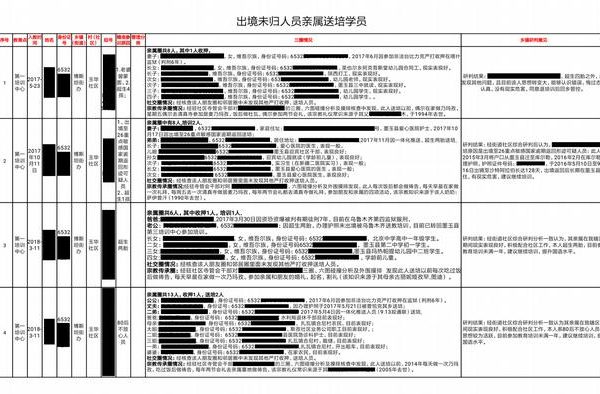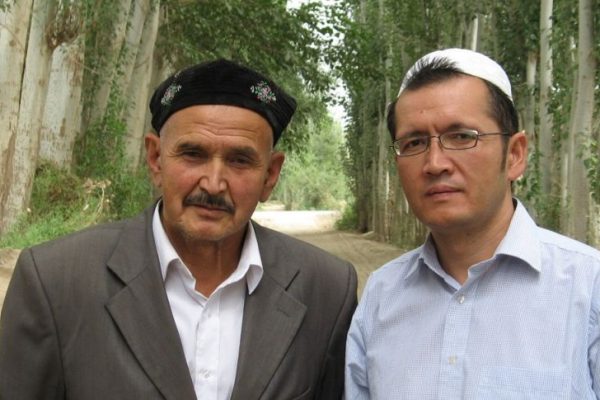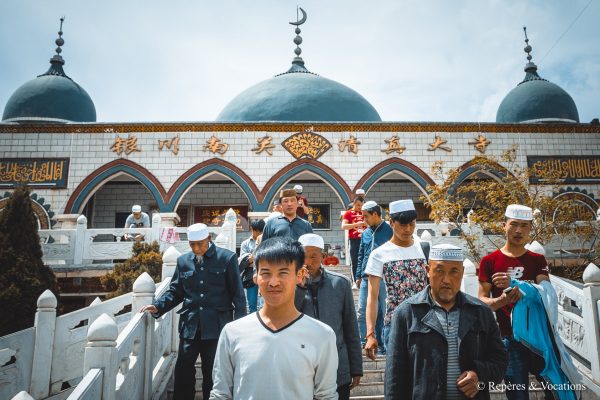The Karakax List also highlights how China is using “guilt by association” to detain the almost 2 million that are said to be imprisoned in the concentration camps across the province of Xinjiang. For every main individual in the document, the 11th column is used to record their family relationships and close contacts.
The Karakax List also highlights how China is using “guilt by association” to detain the almost 2 million that are said to be imprisoned in the concentration camps across the province of Xinjiang. For every main individual in the document, the 11th column is used to record their family relationships and close contacts.
Newly leaked documents from China showcases a list of personal details from more than 3,000 mostly Uyghur individuals from the province of Xinjiang – highlighting aspects such as how often they pray, who they come in contact with, how they dress, and even what websites they are clicking on.
Made up of 137 pages of row and columns, this newly leaked document is said to have come at great personal risk from the same source inside Xinjiang that leaked the previous groundbreaking Xinjiang Papers that highlighted the abuse the Chinese Communist Party was conducting within the region.

The list of personal details contains details on the individual’s background, religious habits, and even whether or not the individual should be released from the concentration camp or not. With China consistently denying any wrong-doing with what they call “re-education centers”, this new document shows clear evidence that Uyghurs and ethnic minority Muslims are not simply sent to education camps – they are being detained and imprisoned specifically for their beliefs and lifestyle.
For example, Row 598 showcases the example of a 38 year old woman who was sent to one of the concentration camps for wearing a hijab in public. Row 66 highlights a 34 year old man who was imprisoned for applying for a passport, despite the comments in his section stating he posed “no practical risk”. In Row 239, a 28 year old man was also sent to a concentration camp for “clicking on a web-link and unintentionally landing on a foreign website”.
Other reasons for imprisonment include “minor religious infection”, “disturbs other persons by visiting them without reasons”, “have relatives abroad”, “thinking is hard to grasp”, and “untrustworthy person born in a certain decade”. Quickly labelled as the Karakax List because of the majority of individuals from the list hailing from Karakax County, leading expert Adrian Zenz has pointed out the horrifying reality of what life is like for Uyghurs in China:
This remarkable document presents the strongest evidence I’ve seen to date that Beijing is actively persecuting and punishing normal practices of traditional religious beliefs. It reveals the witch-hunt-like mindset that has been and continues to dominate social life in the region.”
The Karakax List also highlights how China is using “guilt by association” to detain the almost 2 million that are said to be imprisoned in the concentration camps across the province of Xinjiang. For every main individual in the document, the 11th column is used to record their family relationships and close contacts – meaning that each relative or friend of the individual has been documented as well for how often they pray, how they dress, and where they have travelled to.
For example, Rows 179, 315, and 345 contains the information of one 65 year old individual’s family members, including his children. His records show that his daughters “wore veils and burkas in 2014 and 2015”, and a son with “obvious anti-Han sentiment”. This individuals’ verdict was labelled as “continued training” – meaning he will be continued to be detained in the concentration camps.
The darker side of China: A brief history of the Communist state and the Uyghur Muslims
All of this information has reportedly been collected by Xinjiang’s larger data and surveillance system, called the Integrated Joint Operations Platform (IJOP). The IJOP contains the entire region’s surveillance and policing records, from a larger network of security cameras and mobile and computer spyware.
Despite vocal condemnation by human rights groups and Uyghur activists, China continues to claim this surveillance system is to combat extremism and religious fundamentalism – claiming that these concentration camps across Xinjiang are a necessary tool in a wider “war on terror”. In fact within the Karakax List, more that 100 entries into the individuals imprisoned or under surveillance are labelled as having a “religious atmosphere” at home.
As China continues to conduct its genocidal campaign against the Uyghurs and other ethnic minority Muslims, world leaders remains relatively silent on the issue. Uyghurs continue to be detained in these concentration camps where documented evidence shows examples of torture, mass rape, forced sterilizations, and even death. Clear human rights abuses are being conducted in Xinjiang, and with what appears to be a clear intent of genocide from the Chinese government, we must remain vigilant in spreading awareness, writing to our politicians, and electing those into office who will not continue a blind friendship with the Chinese Communist Party.





